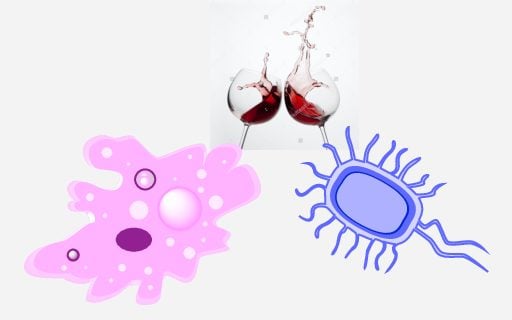So. Does the human microbiota cause cancer? Let’s get right to the meat of the issue. The microbiota is so hot right now and there have been all kinds of speculation (and actual research) on its influence on health and disease.
Actually, microbes have an intimate history with cancer. The first oncogene was, in fact, isolated from a microorganism [1]. The transforming element of Rous sarcoma virus, which causes soft tissue cancer in chickens, was revealed to be a distant relative of the cellular enzyme src [2]. By studying basic biology of a simple chicken virus, researchers discovered that host genes can lead to cancer. Viruses are not the only microorganism to cause cancer; several species of bacteria have been linked to oncogenesis and the classic example is Helicobacter pylori. H. pylori colonization of the stomach is known to cause gastritis. The constant inflammatory state induced by H. pylori increases the risk of stomach cancer as high as 8-fold [4,5]. With the knowledge that inflammation and bacteria can lead to cancer, the obvious site of study is the large intestine, which has a bacterial density of 1012 cells/ml. Compared to the small intestine, which has 10 billion less cells/ml comparatively, the large intestine experiences a 12-fold increase of cancer incidence [6].
Researchers have been postulating that the gut microbiota could cause cancer since the 1970s; right at the eclipse of the life-or-death battle between the tobacco industry and science. With the legal restrictions of one carcinogen in the works, maybe the world was ready to hunt for more cancer-causing demons. For some reason, reading these old papers from the late 60s, early 70s gives me the image of old, white-haired scientists putting puzzle pieces in what they think is a very small, uncomplicated puzzle. Colon cancer is unequally distributed geographically and diet is important (mid-1960s). Diet affects gut microbiota (also mid-1960s). Certain bacteria can degrade bile salts (1968). Colon cancer correlates with bile acid concentration (1975) [7]. OMG, bacterially-produced secondary bile acids cause colon cancer!
Nah, these guys were sharp. They knew they were cracking open a new field. “The unanswered questions still greatly outnumber those answered.” Isn’t that ALWAYS case MJ Hill and BS Drasar??
On the other hand, what does a dude who’s name is literally BS know?
Anyway, here’s where I begin asking philosophical questions. Metabolism in the gut, for example, degradation of bile acids, has a purpose. First of all, bile acids are a product of cholesterol degradation, which is another pesky molecule we might not want too much of. Second of all, bile acids are intestinal soap bubbles that help absorb dietary lipids. Can we blame bacteria for doing their job and helping us absorb those delicious French fries we ate earlier? WHO’S FAULT IS IT? WHO ATE THE FRIES, AMANDA?
As you all know, I am fascinated by bacteria and what they can do. I have really dug deep into this issue: the human microbiota’s association with cancer. This post just sets the stage, scratches the surface, tips the iceberg and many other clichés for beginning a story. Hopefully, I can distill half a century of research into bitesize morsels. Stay tuned for more posts on how your bacteria influence the fact that we’re all inevitably going to get cancer somewhere someday.
- Weiss RA, Vogt PK. 100 years of Rous sarcoma virus. J Exp Med. 2011;208(12):2351–5.
- Frame MC. Src in cancer: Deregulation and consequences for cell behaviour. Biochim Biophys Acta – Rev Cancer. 2002;1602(2):114–30.
- Martin GS. The hunting of the Src. Nat Rev Mol Cell Biol. 2001;2(6):467–75.
- Parsonnet J. Bacterial infection as a cause of cancer. Environ Health Perspect. 1995;103(SUPPL. 8):263–8.
- Kamangar F, Dawsey SM, Blaser MJ, Perez-Perez GI, Pietinen P, Newschaffer CJ, et al. Opposing risks of gastric cardia and noncardia gastric adenocarcinomas associated with Helicobacter pylori seropositivity. J Natl Cancer Inst. 2006;98(20):1445–52.
- Sun J, Kato I. Gut microbiota, inflammation and colorectal cancer. 2017;3(2):130–43.
- Hill, MJ, Drasar BS. The normal colonic bacterial flora. Gut. 1975;16(4) 318-23.


Thanks for posting. I am registering to receive notification of your future posts.
Dear Dr. Sethre,
Many thanks. Writing a new post now. Appreciate the interest!
Amanda
Hi! Thanks for sharing this information, i learned about how individual diet is important to reduce the risk of dying from colon cancer i just wanna know how diet affects gut microbiota?
Hi Paul, Thanks for the question! Diet is a strong influence on the gut microbiota. The only food they eat is the food WE eat! A specific example of a diet-related risk factor for developing colon cancer is red meat because of gut microbiota mediated nitrogen reduction. Reduced nitrogen (nitrite) can react with organic compounds (things with carbon…so basically everything we eat) to produce molecules that directly mess up our DNA. However, don’t worry too much about giving yourself colon cancer by enjoying a hamburger every once in awhile. Every time we eat a meal, we change the gut microbiota so as long as you eat a variety of foods, it should keep a healthy diversity of bacteria in your gut. That being said, patients with colon cancer definitely have altered gut microbiota. But that gives us a chicken and the egg situation: did the change in gut bacteria induce colon cancer…or did having colon cancer change the composition of bacteria? These are the questions scientists are trying to answer now. Thanks again for reading and I’m planning a post specifically on colon cancer and bacteria. Stay tuned!